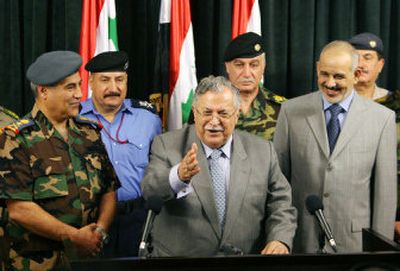Bombs kill 11 children on Baghdad soccer field

BAGHDAD, Iraq – Bombs exploded on a soccer field Wednesday killing 11 young people, and at least 42 other people – two of them Americans – died elsewhere in sectarian or political violence. Still, the president said plans are on track for Iraqis to take over security.
The two homemade bombs went off on a soccer field in the mostly Shiite district of Amil in west Baghdad, killing both players and spectators ranging in age from 15 to 25, police 1st Lt. Maitham Abdul Razzaq said.
Two mortar shells struck another Shiite district, Abu Dshir, killing three people under age 15, police Capt. Firas Queti said. One shell exploded on a soccer field and the other hit a house, wounding a couple and their child, he said.
Two Americans died in combat in Anbar province, the Sunni insurgent stronghold west of Baghdad, the U.S. command said. One was a Marine assigned to the Army’s 1st Armored Division and the other was a soldier with the 9th Naval Construction Regiment, the command said.
No group claimed responsibility for the Baghdad attacks, which appeared to be part of the tit-for-tat attacks by Sunni and Shiite extremists. The attacks threaten the unity government of Prime Minister Nouri al-Maliki, which took office May 20.
The surge in sectarian violence has prompted the U.S. command to send at least 3,700 American soldiers from the northern city of Mosul to reclaim the capital’s streets from Sunni insurgents, Shiite militias, rogue police, criminals and freelance gunmen.
Despite the violence, President Jalal Talabani said the government remains confident it can cope with the security crisis and vanquish extremist groups, calling recent attacks “the last arrows in their quivers.”
“We are highly optimistic that we will terminate terrorism this year,” Talabani said. “The Iraqi forces will take over security in all Iraqi provinces by the end of this year gradually, and if God’s will, we will take the lead.”
Talabani’s prediction was far rosier than those from U.S. commanders and Iraqi officials, and the president’s staff quickly sought to explain that he was referring to the beginning of a “process” for Iraqis to assume control, not the final step.
The Iraqis have been given security responsibility in only one of 18 provinces – Muthanna. It is a remote southern province with an overwhelmingly Shiite population and is among the most peaceful in the country.
“What he meant is that the process will be under way by the end of this year,” said Talabani’s media adviser, Hiwa Osman. “We are not expecting a complete handover by the end of this year – nobody really is.”
Defense Secretary Donald H. Rumsfeld said he did not see Talabani’s remarks but hopes Iraqis will take over as conditions permit. “He’s the president of Iraq, and he can make his statements. And I didn’t see the context of it or the translation of it, and I can’t comment beyond what our policy is.”
Pentagon spokesman Bryan Whitman said there are “too many variables” to make any kind of firm prediction about the handover of security.
“The Iraqi security forces are making great progress. Every week, every month, they get more capable,” Whitman said at the Pentagon.
In London, Britain’s top military official said he expected British troops to hand over control of the southern province of Basra to Iraqi security forces early next year.